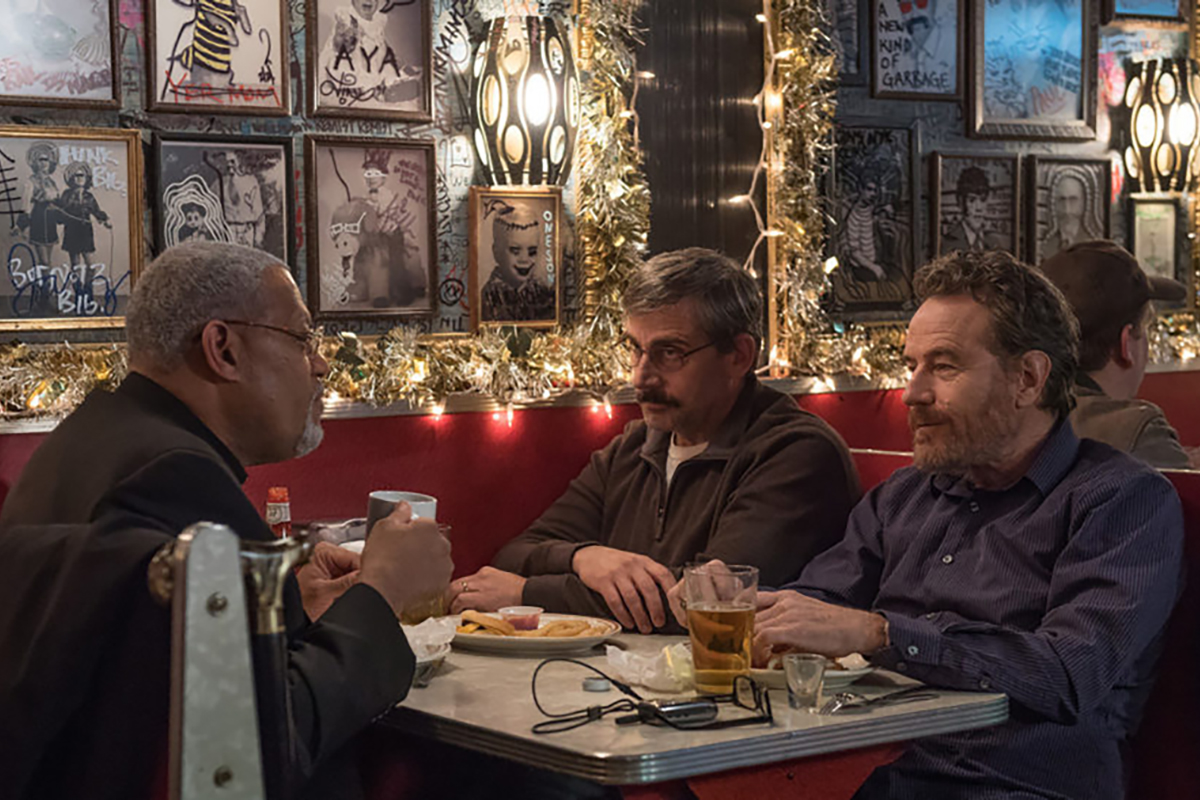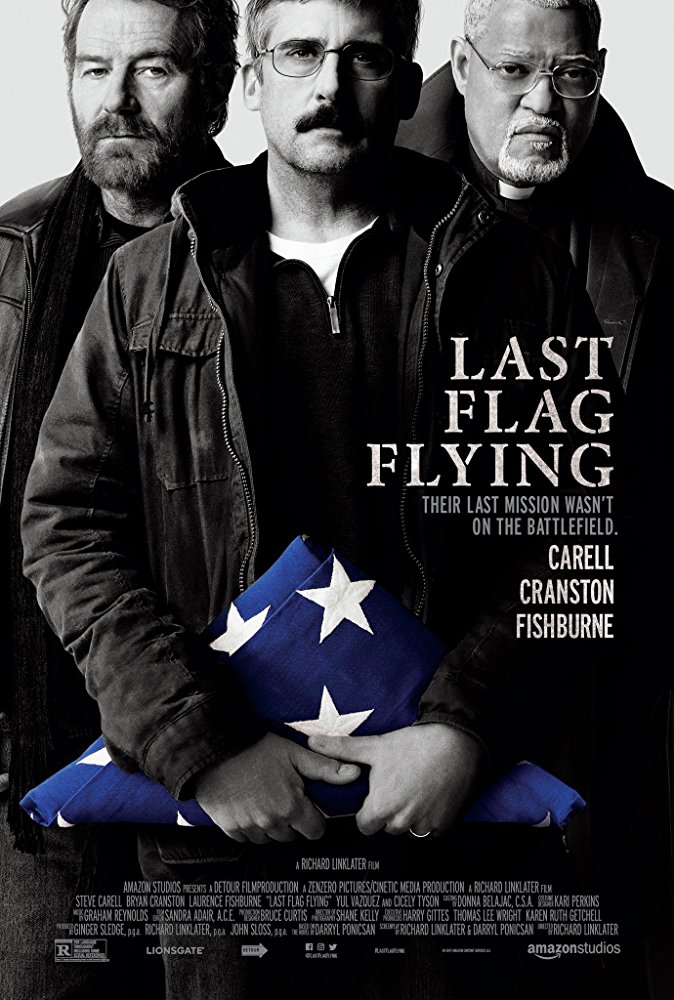
Reviewed by Jan Hardy, Library Specialist.
Last Flag Flying (BRD-305)
Steve Carell, Bryan Cranston, Laurence Fishburne (2017)
 (Rated R)It’s been a while since I’ve been able to wholeheartedly recommend a Filmed-in-Pittsburgh movie, so I was pleased to discover this one. More than a buddy movie or road-trip saga, I’d call this one an old pro ensemble piece, with actors of a certain age working well together, clearly enjoying each other’s company even as their characters grate on each other’s nerves.
(Rated R)It’s been a while since I’ve been able to wholeheartedly recommend a Filmed-in-Pittsburgh movie, so I was pleased to discover this one. More than a buddy movie or road-trip saga, I’d call this one an old pro ensemble piece, with actors of a certain age working well together, clearly enjoying each other’s company even as their characters grate on each other’s nerves.
Steve Carell, of “The Office” but becoming better known for his dramatic acting, plays Larry, a veteran recently widowed who has also lost his son in the Iraq War. He decides to ask two fellow Marines to help him pick up his son’s body and take it home to Portsmouth for burial. Along the way, they bicker, remember the war and rediscover their bonds. It’s a simple premise, enriched by wonderful bits of comedy and moments of reflection for each character. Even the smaller scenes and roles provide memorable gems.
Bryan Cranston plays Sal, a bartender/alcoholic who barely recovers enough each day to re-open his bar. He’s cynical and brash, and he lives with a plate in his head from a wartime injury that’s unexplained except that “alcohol was involved.” Laurence Fishburne plays Richard Mueller, who lives with a “shot-up leg,” has married and become a preacher, much to Sal’s derision. One of the funniest scenes happens when Sal goads Pastor Richard into swearing, and Richard unleashes a full-blown tirade including the Pittsburgh insult “jagoff” to Sal’s utter delight. Larry is quietest of the three, withdrawn into himself, in mourning for his son and his wife. He spent two years in Portsmouth in the brig for an unexplained insubordination, taking the blame for his friends; yet he remained loyal to the Marines, inspiring his son to enlist.
So many things work together in this film beyond the understated acting of the three main characters - Richard Linklater’s directing, an excellent script, and quiet moments that give the film so much more depth. As the three check into a motel, the lobby TV shows the capture of a dazed, scruffy-looking Saddam Hussein. The motel clerk cackles with glee and a U.S. official intones, “We now have final resolution.” One shot of the three veterans’ faces speaks volumes.
At Dover, while Larry accepts formal thanks and sympathy from the Colonel, Sal and Richard wait across the room. Sal questions a young Marine who was with Larry’s son when he was killed. As Sal finds out the truth, Larry asks to see his son, breaking the usual etiquette. The Colonel tries to persuade him against it, but Larry is adamant. The scene unfolds without sensationalism, but with masterful effect. Seeing his son and then finding out the truth from Sal, Larry decides to bring him home for a non-military burial. The Colonel reluctantly agrees, but assigns the young Marine to accompany the body, and the train trip home begins.
Larry begins to question both Vietnam and the Iraq war, and Sal joins in his bitterness. Mueller has a more pragmatic sense of duty, and bonds with the young Marine in a fatherly way. In one scene, the three men keep him company in the baggage car with the coffin, reminiscing with raunchy stories until even quiet Larry giggles uncontrollably. Yet they also remember their betrayal of a fellow Marine, and grieve for the repeated myths of war: “Stay the course. If we pull out now, all our heroes will have died in vain.” “Men make the war and war makes the men. It never changes.” Seeing Bush on TV, Doc wonders, “Would it be worth his life? Would it be worth his daughters’ lives?”
Back home, they visit the mother of their friend who was killed in Vietnam; she’s now a great-grandmother, still cherishing her son’s memory. Cicely Tyson elevates any scene she’s in, and this one is worth the entire movie. The three leave her modest little house with a changed perspective. Again, the scene is low-key but pivotal.
I think no matter what your feelings are about war or patriotism, “Last Flag Flying” is a graceful expression of humanity and friendship in the face of terrible tragedy. There are no battle scenes, but you feel the trauma, loyalty and loss. As one character says, “You’re there for your brothers. That’s all that matters.” Laurence Fishburne said in an interview, “We have a huge debt that we owe to all these men and women.” “Last Flag Flying,” with all its comedy and irreverence, is a worthwhile step towards recognizing that debt and honoring those veterans.
